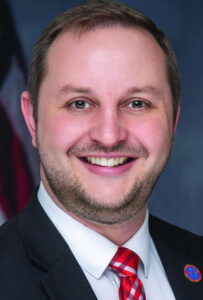School Happenings: Q&A on new tax
Q: What is at risk if the penny tax does not pass?
A: There will be increased risk to students because even more teachers and employees who care for our children will be terminated. Up to 25 teachers and employees could lose their jobs if funding does not come, which will lead to even more students in already overcrowded classrooms. Academic programs will greatly suffer. To be clear, all jobs are at risk, as the Alabama Fair Dismissal Act and State Tenure Law clearly indicate that even tenured and non-probationary positions can be eliminated when there are no dollars to fund them. If the penny tax is not passed, there will be little or no money to pay teachers to coach or to lead fine arts programs.
If the penny tax does not pass, the school system will be operating “in the red” and accumulating debt that will take years to overcome. It would take years, perhaps an entire generation of students, to dig out of that catastrophic financial hole. Even when the economy turns around, the system would be spending money to repay debt and not on student achievement. It’s a predicament we can ill afford.
Q: Is this a permanent tax?
A: No. By law and per the referendum’s language, this tax will expire in two years (24 months). A one-cent sales tax equals one penny per dollar. For example, if you spend $100 dollars at the grocery store, the school tax equates to one dollar.
Q: How much revenue will the penny tax generate and will the revenue remain in Franklin County?
A: One-hundred percent of the penny tax stays in Franklin County. The penny tax will provide for Russellville City Schools approximately $800,000 a year for each of its two years. The additional revenue will not totally solve our crisis, but it will help us avoid additional cuts at the local school level, allow the district to maintain more services for our schools, and allow school fine arts and athletic programs to remain in place. Some critical teachers and school level support staff positions could also be reinstated where warranted. State law also requires the district to rebuild its fund balance to meet State regulations.
Q: What happened to cause the financial problems for Russellville schools?
A: The problem facing Russellville City Schools is one of reduced funding, not increased or inefficient spending. Within a 24-month period, funding for the school system has been reduced in excess of $2.5 million due to declining local and state revenues. This is an unprecedented amount. Additional cuts in state funding are likely. Russellville City has always been focused on maximizing all funding received. This is evidenced by Russellville City having the 13th lowest Central Office expenditure among Alabama’s 131 school districts.
Schools in Alabama are primarily funded by sales and income tax. In a recession, people spend less so retail sales fall. People also lose their jobs so they pay less income tax. As a result, there is not enough money taken in by the state to meet budget requirements. When this happens, the governor declares that the budget must be reduced – or prorated – so that it is in line with available dollars. These budget cuts are passed along to local school systems after school budgets are passed and personnel are employed.
Q: Isn’t the school system supposed to have a savings account or fund balance?
A: Yes. The state requires school systems to have a general fund balance equal to one month’s operating costs. A recent report by the Alabama State Department of Education shows approximately half of the state’s school systems, including Russellville City, have little or no reserve. Our school system had more than $2.5 million in its fund balance in 2005. Since then, the state has reduced its funding 11 percent (FY 2009) and 7.5 percent (FY2010). After these severe cuts, the fund balance was used to help save school level positions and to sustain vital operations. Teachers who are under contract cannot legally be terminated mid year. When state funding is reduced through proration, the school system’s local fund balance must be used to make up the shortfall.
Q: Couldn’t the school system have paid teachers and employees with the money it used to build new school buildings?
A: No. Capital construction dollars cannot be used for salaries or operational costs of the school system.
Q: Couldn’t the Central Office be cut more?
A: The Alabama State Department of Education ranks the Russellville City School System in the top 13 school systems out of 131 with the most efficient administrative costs.
Q: Why should I vote for the penny tax when I don’t have a child in the school system?
A: The quality of life in our community hinges on great schools. Corporations and industry focus on the quality of the school system as a primary factor in their decision on location. If the penny tax does not pass, the quality of Russellville City Schools will be jeopardized to the point of negatively influencing prospective residents and businesses, resulting in a negative impact to the county’s economy.
Q: Isn’t property tax a better way to fund schools and shouldn’t relief be sought for the “10 mil match equity funding” issue?
A: Yes, property taxes are generally less susceptible to the whims of the economy. But “the schoolhouse is on fire and there’s no time to dig a well,” meaning a re-work of the property tax structure and resolving equity funding issues are long term initiatives. All of the money raised by the penny tax will stay in Franklin County!
Q: What accountability does the school board have with the handling of finances?
A: The school system is audited annually by an independent auditing firm. Monthly financial information is readily available for public review at www.rcs.k12.al.us. State law requires school systems to submit information to the Alabama State Department of Education on a monthly and annual basis. The school system has always committed to full accountability and transparency and will continue to do so in the expenditure of the proceeds from the penny tax.
Q: Why doesn’t Russellville City Public Schools employ locally-funded teachers and employees?
A: It’s been a well publicized fact for many years that the State of Alabama does not adequately fund public education. Russellville City has always used local revenue to hire additional teachers, nurses, aides, school resource officers, and other support personnel in order to achieve educational excellence. At one time, Russellville City Schools employed 30 teachers from local funds. Currently, we have one teacher employed from local funds!
AdvancED/Southern Association of Colleges and Schools (SACS) praised the school system’s commitment to world class education and the investment it had made in people resources to achieve that goal. The school system was awarded district accreditation in March 2008. (Fewer than half of the districts in Alabama have achieved this significant milestone.) District accreditation will be at risk if material changes are made to the academic program and/or the school system is not able to achieve the tasks given by the accreditation committee.








